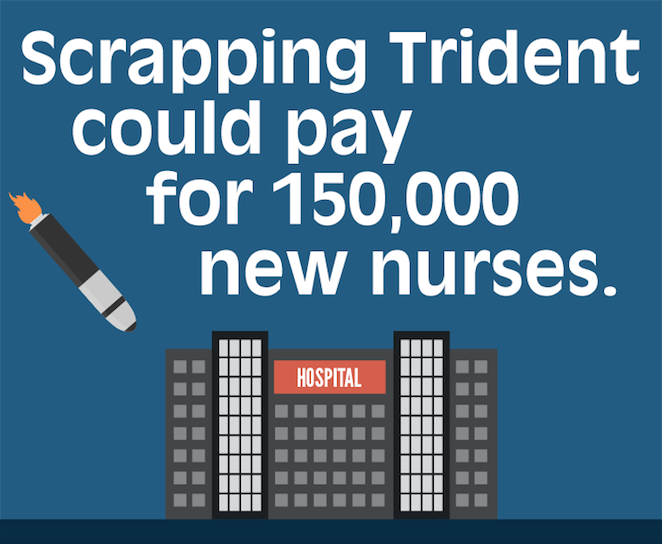
(Image source: http://www.medact.org/campaigns-actions/open-letters/trident-take-action/)
Trident- what is it?
Trident very much is a relict of Britain’s Cold War nuclear deterrence strategy. It consists of four British submarines carrying nuclear weapons, up to 8 missiles and 40 nuclear warheads each. According to CNDUK (Campaign for Nuclear Disarmament UK) these are 8 times more powerful than the atomic bomb that was dropped on Hiroshima in 1945, which killed at least 129.000 people.
One of these submarines is floating somewhere in the oceans of this world at all times while the other three are either in maintenance or used for training. Trident was decided on in the early 1980s by the Thatcher government and came into use in the 1990s. Already back then BPEC opposed the use of Trident. In the last year or so the debate around Trident has livened up again and once more it is important to oppose it.
Why now?
If Trident was to be kept in use it has to be renewed soon. The decision to renew it has already been made by parliament in March of 2007, when 409 MPs voted for the renewal, to 61 votes against it. Since then there has been some planning and conceptual work going on and the “Initial Gate” phase, which is the Project Approval Stage of the renewal process, has been approved. However, in October 2010, the government chose to delay the ultimate decision if the renewal process should continue and how many submarines should be ordered until this year, 2016.
What are the political positions?
The Conservative Party have always supported the renewal of Trident with the argument that the UK needs nuclear weapons as an “insurance policy” against attacks on the UK. They pledged for replacing Trident in their manifesto in the general elections last year.
Labour has backed the renewal of Trident until now, stating that it is a cornerstone of peace and security. This position could change, though. After the election of Jeremy Corbyn, who opposes Trident, as leader of the Labour Party it is in doubt if Labour will stick with its support of Trident.
The SNP heavily oppose Trident’s renewal and their campaign against it was a fundamental part of their campaign in the general elections last year. They have described Trident as “unusable and indefensible”, explaining that “the plans to renew it are ludicrous on both defence and financial grounds”.
What’s the argument for renewing Trident?
Supporters of Trident say that it is an integral part of the UK’s security. Because of new threats, for example from “rogue states” and terrorist groups, there is a lot of uncertainty of how attacks on the UK could be dealt with. Nuclear weapons could help with deterrence. Furthermore, some say that the UK’s global influence would shrink without nuclear weapons. Besides the defence industry is a big employer, according to the BBC 15.000 jobs could be lost if the renewal of Trident doesn’t go ahead.
And the opposition?
Even though the renewal of Trident might cause the loss of some jobs, scrapping it could actually create a lot more jobs. The costs for Trident are enormous. The government estimated the costs between £15bn and £20bn, but Greenpeace has calculated that it might be more like at least £34bn and Jeremy Corbyn of the Labour party quotes £100bn. With this money Accident and Emergency departments across the country could be fully funded for 40 years, 150.000 new nurses could be employed, 1.5 million affordable homes could be built, 30.000 new primary schools or the tuition of 4 million students could be paid (numbers according to CNDUK). In short, there are better things that could be done instead of wasting money on nuclear weapons that might never be used.
The use of Nuclear Weapons is questionable, as it is illegal under international law. In 1996, the International Court of Justice has ruled that the threat or use of nuclear weapons is contrary to the rules of international law. Thus, Trident is not much more than a status symbol, as Tony Blair even has admitted in 2007, when the Labour Party committed to the renewal. In Blair's words, “the expenses are huge and the utility non-existent in terms of military use”, however, giving it up would be “too big a downgrading of our status as a nation”.
If an outdated, useless nuclear weapons system is more of a status symbol than a functioning health care or education system, there is clearly something wrong with our value system. And do we really STILL need a submarine-based system that was designed during the Cold War against threats from the Soviet Union? Nuclear weapons are extremely dangerous and deadly and should not be kept just as a status symbol.
What can be done?
Now more than ever it is important that we show the government that the majority of the British people does not want Trident. If you want to become active you can sign this petition. BPEC was at the national demonstration called for by the Campaign for Nuclear Disarmament UK to scrap Trident in London on the 27th of February with a stall, and hosted a Chalktivist protest outside the centre before the demo (watch the video here). Keep your eyes and ears open for the next demo, where we would love to see as many Brightonian faces as possible!